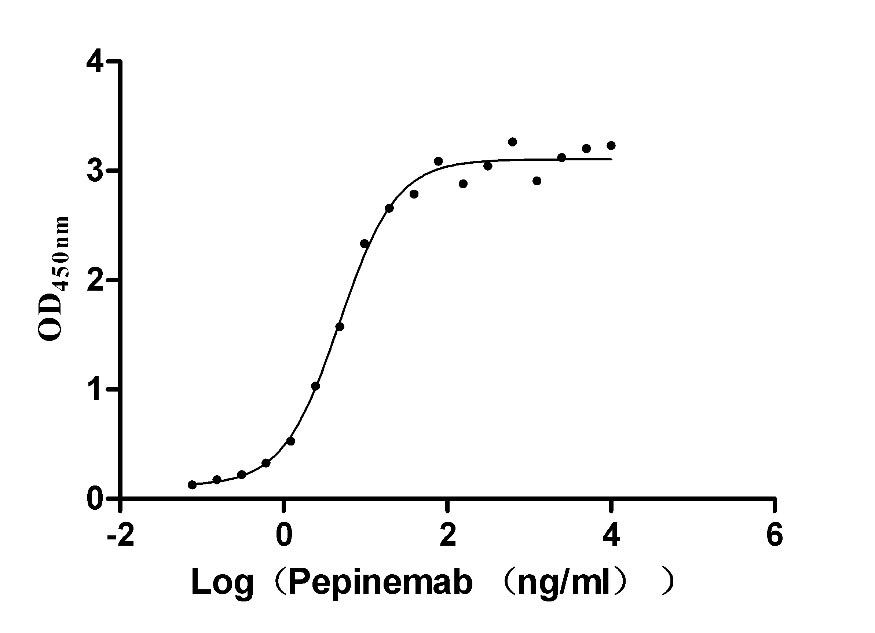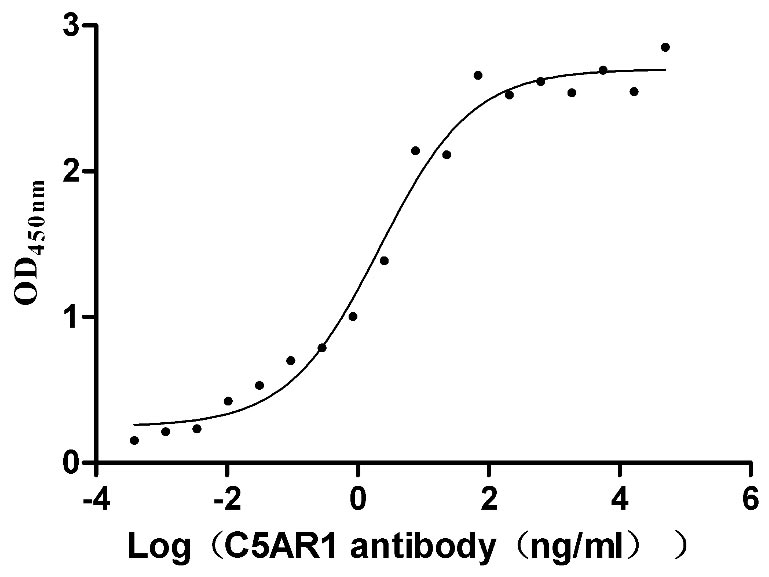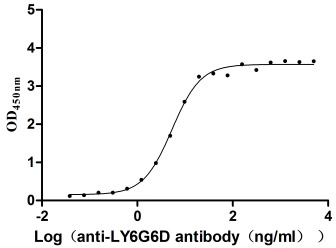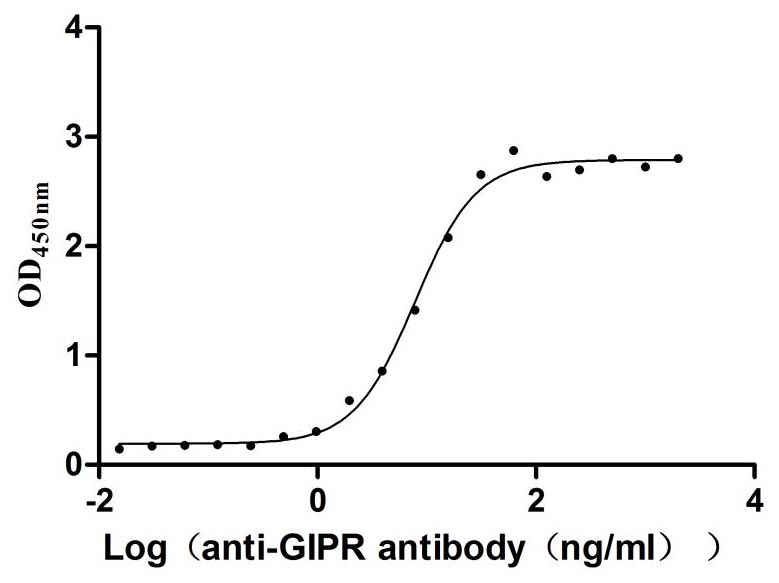Recombinant Mouse Thymic stromal lymphopoietin (Tslp)
-
货号:CSB-YP025141MO
-
规格:
-
来源:Yeast
-
其他:
-
货号:CSB-EP025141MO
-
规格:
-
来源:E.coli
-
其他:
-
货号:CSB-EP025141MO-B
-
规格:
-
来源:E.coli
-
共轭:Avi-tag Biotinylated
E. coli biotin ligase (BirA) is highly specific in covalently attaching biotin to the 15 amino acid AviTag peptide. This recombinant protein was biotinylated in vivo by AviTag-BirA technology, which method is BriA catalyzes amide linkage between the biotin and the specific lysine of the AviTag.
-
其他:
-
货号:CSB-BP025141MO
-
规格:
-
来源:Baculovirus
-
其他:
-
货号:CSB-MP025141MO
-
规格:
-
来源:Mammalian cell
-
其他:
产品详情
-
纯度:>85% (SDS-PAGE)
-
基因名:
-
Uniprot No.:
-
别名:Tslp; Thymic stromal lymphopoietin; Thymic stroma-derived lymphopoietin
-
种属:Mus musculus (Mouse)
-
蛋白长度:Full Length of Mature Protein
-
表达区域:20-140
-
氨基酸序列Y NFSNCNFTSI TKIYCNIIFH DLTGDLKGAK FEQIEDCESK PACLLKIEYY TLNPIPGCPS LPDKTFARRT REALNDHCPG YPETERNDGT QEMAQEVQNI CLNQTSQILR LWYSFMQSPE
-
蛋白标签:Tag type will be determined during the manufacturing process.
The tag type will be determined during production process. If you have specified tag type, please tell us and we will develop the specified tag preferentially. -
产品提供形式:Lyophilized powder
Note: We will preferentially ship the format that we have in stock, however, if you have any special requirement for the format, please remark your requirement when placing the order, we will prepare according to your demand. -
复溶:We recommend that this vial be briefly centrifuged prior to opening to bring the contents to the bottom. Please reconstitute protein in deionized sterile water to a concentration of 0.1-1.0 mg/mL.We recommend to add 5-50% of glycerol (final concentration) and aliquot for long-term storage at -20℃/-80℃. Our default final concentration of glycerol is 50%. Customers could use it as reference.
-
储存条件:Store at -20°C/-80°C upon receipt, aliquoting is necessary for mutiple use. Avoid repeated freeze-thaw cycles.
-
保质期:The shelf life is related to many factors, storage state, buffer ingredients, storage temperature and the stability of the protein itself.
Generally, the shelf life of liquid form is 6 months at -20°C/-80°C. The shelf life of lyophilized form is 12 months at -20°C/-80°C. -
货期:Delivery time may differ from different purchasing way or location, please kindly consult your local distributors for specific delivery time.Note: All of our proteins are default shipped with normal blue ice packs, if you request to ship with dry ice, please communicate with us in advance and extra fees will be charged.
-
注意事项:Repeated freezing and thawing is not recommended. Store working aliquots at 4°C for up to one week.
-
Datasheet :Please contact us to get it.
相关产品
靶点详情
-
功能:Cytokine that induces the release of T-cell-attracting chemokines from monocytes and, in particular, enhances the maturation of CD11c(+) dendritic cells. Can induce allergic inflammation by directly activating mast cells.
-
基因功能参考文献:
- this paper shows that IL-33 promotes gastrointestinal allergy in a TSLP-independent manner PMID: 28656964
- a new pathway for the activation of Treg involving in tumor-derived HMGB1 and TSLP, and have important implications for incorporating HMGB1 inhibitors into cancer immunotherapy. PMID: 29116372
- Effects of Linalyl Acetate on Thymic Stromal Lymphopoietin Production in Mast Cells. PMID: 30011850
- findings suggest a role of TSLP in directly promoting Th2 cell effector function and support the notion of TSLP as a key driver of Th2 PMID: 29339496
- Thymic stromal lymphopoietin and IL-33 promote skin inflammation and vaccinia virus replication in a mouse model of atopic dermatitis. PMID: 26830114
- the pathological mechanisms of particulate matter PM2.5 may be associated with allergic/steroidresistant airway inflammation, Tcell helper (Th)1/Th2 cytokine production and upregulation of TSLP expression in a murine model of allergic and steroid-resistant asthma. PMID: 28765890
- Results suggest combinatorial mechanisms involved in the tissue-selective regulation of thymic stromal lymphopoietin (TSLP) transcription in epidermal keratinocytes and intestinal epithelial cell(s) (IEC). PMID: 28115699
- these results suggest that TSLP-TSLPR signaling is pivotal in the induction of nasal respiratory immunity against pathogenic pneumococcal infection PMID: 27924821
- blockading the JAK/STAT pathway restrains inflammatory Th2 cell response induced by TSLP-DCs in allergic rhinitis. PMID: 28214951
- study concludes that IL-33 and TSLP are required for epithelial cell IL-25 expression, mucous metaplasia, and ILC2 expansion following early-life rhinovirus infection PMID: 28701507
- TSLP plays a role in dysfunction of airway epithelial adherens junctions E-cadherin in house dust mite (HDM)-induced asthma. Mice treated with an anti-TSLP mAb ameliorated airway inflammation, the decreasing and aberrant distribution of E-cadherin and beta-catenin as well as phosphorylation(p)-AKT induced by HDM. In vitro, HDM increased the expression of TSLP and E-cadherin dysfunction by PI3K/Akt signaling pathway. PMID: 28400057
- this study shows that TSLP is a key target of Mi-2beta in keratinocytes, and that loss of TSLP signaling in regulatory T cells prevents their activation PMID: 28092372
- These data demonstrate that multiple pathogenic strains of RSV induce IL-13-producing group 2 innate lymphoid cell proliferation and activation through a TSLP-dependent mechanism in a murine model and suggest the potential therapeutic targeting of TSLP during severe RSV infection. PMID: 27156176
- the effects of TSLP on myeloid cells are crucial in reducing the multiple organ failure that is associated with systemic inflammation. PMID: 26934097
- The inflammatory phenotype in barrier-defective skin is shaped by counterregulation between the TSLP/type 2 and IL-23/type 17 axes. PMID: 26993035
- this study shows that activation of primed TH2 cells occurs independently of group 2 innate lymphoid cells or their cytokines but that the effector function of both cell types was dependent on combinatorial exposure to IL-33, IL-25 and TSLP PMID: 27749840
- TNF-alpha and IL-1beta, which are partly produced by LPS-activated leukocytes, contribute to TSLP production via TLR4 activation in vivo. PMID: 27271511
- IL-33-ERK/JNK/p38/Egr-1/TSLP axis involved in allergic skin Th2 inflammation PMID: 26120956
- Suggest that TSLP may be involved in acute lung injury, and blockage of TSLP signaling using TSLPR-Ig improves ALI at least in part by regulation of dendritic cell functions. PMID: 26617780
- TSLP expression in the skin is mediated via RARgamma-RXR pathways. PMID: 26531761
- results highlight a previously unappreciated function of the immune system in controlling the early development of cancer and establish a fundamental role for TSLP and Th2 cells in tumor immunity against early-stage cancers. PMID: 26927668
- Thymic stromal lymphopoietin-induced interleukin-17A is involved in the development of IgE-mediated atopic dermatitis-like skin lesions in mice PMID: 26310839
- production by monocyte-derived dendritic cells requires the integration of signals from dectin-1, the IL-1 receptor, and endoplasmic reticulum stress response stress signaling pathways PMID: 26573878
- The short TSLP isoform ameliorates experimental colitis in mice and prevents endotoxin shock. The long TSLP isoform is proinflammatory and is only expressed during inflammation. PMID: 26014813
- Suggest that Treg defects in ApoE(-/-) mice might partially be attributed to the disruption of TSLP-TSLPR-LAP signaling in epithelial cells and dendritic cells. PMID: 25544178
- expression of, and immune activation by, TSLP contributes significantly to the immunopathology of experimental autoimmune encephalomyelitis. PMID: 25753260
- These results demonstrate a role for TSLP and IL-25 in the atopic march from skin sensitization to food allergic responses and provide a model system for the generation of potential therapeutic interventions PMID: 25365222
- basophils and TSLP have pivotal roles in Th2 development in the skin during the sensitization phase of food allergy. PMID: 24860117
- Thymic stromal lymphopoietin plays divergent roles in the pathogenesis of atopic and nonatopic asthma phenotypes by either enhancing Th2 responses or curtailing T-helper 17 responses. PMID: 24961817
- TSLP signaling in CD41 T cells is required for not only TH2 memory cell formation in vivo but also the recall response of the memory cells to local antigen challenge. PMID: 25441291
- constitutively expressed by hepatocytes and increased during halothane-induced liver injury PMID: 24723460
- TN DC represent a dermal DC subset that should be considered in future studies of TSLP-dependent contact sensitization and skin immune responses. PMID: 25057004
- Report glyphosphate-rich air samples stimulate airway inflammation via IL-33/TSLP/IL-13 pathways. PMID: 25172162
- TSLP levels peak early but are sustained during the first 48 h of sepsis. PMID: 24990542
- chronic exposure to natural airborne allergens triggers a network of innate and adaptive type 2 immune responses and airway pathology, and IL-33 and thymic stromal lymphopoietin most likely play key roles in this process. PMID: 25015831
- Skin Tslp initiates Th2 responses through an orchestrated immune cascade. PMID: 24284909
- plays an important role as a master switch of allergic inflammation because it promotes Th2-type immune responses by inducing the activation of dendritic cells. PMID: 24599138
- Increased density of intraepithelial mast cells in patients with exercise-induced bronchoconstriction regulated through epithelially derived thymic stromal lymphopoietin and IL-33. PMID: 24220317
- Epicutaneous sensitization on a disrupted skin barrier is associated with accumulation of TSLP-elicited basophils, which are necessary and sufficient to promote antigen-induced intestinal food allergy. PMID: 24560412
- promotes mutualistic T-cell responses following intestinal bacterial colonization PMID: 23515135
- RG1 has the inhibitory effect of TSLP production and caspase-1 activity in AR experimental model. PMID: 24053327
- The structure of the mouse TSLP-mediated signaling complex reveals how TSLP establishes extensive interfaces with its cognate receptor (TSLPR). PMID: 24632570
- These results suggest that Nickel allergy may be triggered by a TSLP/TSLPR-mediated interaction between epithelial and immune cells PMID: 24670797
- TSLP stimulation can induce cellular senescence during airway remodeling in asthma. Inhibiting the signaling pathways of cellular senescence overcomes TSLP-induced airway remodeling PMID: 24167583
- These results indicate that the progesterone suppresses Th17 cell responses, and enhances the development of Treg cells, through TSLP-dependent mechanisms, and play a role in female asymptomatic gonococcal infections. PMID: 23835188
- these data suggest that TSLP uniquely participates in local immunity in the respiratory tract and modulation of TSLP levels may promote long-term CD8 T cell immunity in the mucosa when other prosurvival signals are limiting. PMID: 24489089
- Report mouse cell line producing high levels of TSLP which can be used in high-throughput screening for anti-allergy agents. PMID: 24252242
- TSLP expression is enhanced by the absence of microbiota in mice with defective skin barriers PMID: 23698100
- Findings show that keratinocyte-derived TSLP activates sensory neurons directly to evoke itch behaviors. PMID: 24094650
- TSLP expression in CCR2-/- mice may contribute to the propensity of these mice to develop exaggerated Th2-type immune responses PMID: 23472158
显示更多
收起更多
-
亚细胞定位:Secreted.
-
数据库链接:
KEGG: mmu:53603
STRING: 10090.ENSMUSP00000025237
UniGene: Mm.143716
Most popular with customers
-
Recombinant Human Semaphorin-4D (SEMA4D), partial (Active)
Express system: Mammalian cell
Species: Homo sapiens (Human)
-
Recombinant Human C5a anaphylatoxin chemotactic receptor 1 (C5AR1)-VLPs (Active)
Express system: Mammalian cell
Species: Homo sapiens (Human)
-
Recombinant Macaca fascicularis lymphocyte antigen 6 family member G6D (LY6G6D) (Active)
Express system: Yeast
Species: Macaca fascicularis (Crab-eating macaque) (Cynomolgus monkey)
-
Recombinant Rat Gastric inhibitory polypeptide receptor (Gipr), partial (Active)
Express system: Mammalian cell
Species: Rattus norvegicus (Rat)
















